Central African Republic
Last month, I compared my list of African countries I hadn’t seen with a map of visa requirements for US citizens. One African country stood out: The Central African Republic (CAR). CAR requires no visas – or any other entry requirements – for US citizens. Yay! So, I booked a one-way ticket to Bangui, CAR’s capital city and only international airport, and figured I’d sort out on-going travel details once I got there.
At the same time, I reviewed the ominous US State Department travel advisory about Central African Republic

… and decided to go there anyway. Although everything worked out okay, I’m glad I didn’t over-plan my travels.
On my arrival at Bangui International Airport, immigration was faster and easier than flying into JFK. No queues. No questions asked. Granted, only about a dozen passengers deplaned in Bangui … .and I was the only non-African.
With my passport stamped, I stepped out of the terminal into burning sunshine, a parking lot full of dented vans and motorcycles, and a crowd of people shuffling through fine orange dust. My first thought was “This is where Americans are welcome to come visa-free?”
On our ride into town, I took a video with my iPhone to give you an idea of what the city of Bangui looks like. We started out by taking some back alleys to avoid military checkpoints.

From Bangui, it’s possible to travel downriver to Brazzaville.
I arrived at Hotel Levy’s at at 8:30am on a Sunday morning. Since my room wasn’t ready yet, I strolled over to the Cathédrale Notre-Dame, the most photographed building in Bangui.
CAR’s official languages are French and Sango. So, at the cathédrale, I greeted some colorfully dressed folks with “Bonjour, ca va?” I was immediately invited to sing in the choir. They handed me the sheet music and put me in the tenor section. African church choirs give me goosebumps. Mass lasted about 90 minutes, and we sang at least half the time. We danced, too, of course.
As its name suggests, CAR is in the center of Africa. You may not have ever given CAR much thought, but it’s not a small country. CAR is almost as big as Texas. I ended up spending 8 days in Bangui where I learned that CAR – like Texas – is a land of extremes.
First some history. CAR was once part of French Equatorial Africa. After decades of French rule and forced labor, the natives got restless. They rebelled and declared their independence from France in 1960. After that, CAR descended into chaos under the leadership of various dictators. Things Fall Apart and its sequel, No Longer at Ease, by Chinua Achebe, paint a pretty good picture of what happened during that era.
In the 70’s, a particularly notable megalomaniac named Marshal Jean-Bédel Bokassa came to power. He modeled himself after Napoleon Bonaparte, proclaimed himself emperor of the Central African Empire, and spent a third of the country’s annual income on his lavish coronation ceremony. (Despite invitations, no foreign leaders attended the event.) Emperor Bokassa was deposed in 1979. In exile, he’s said to have bragged about being the world’s last emperor. After Bokassa, CAR was ruled by a series of military juntas who took turns assassinating each other’s leaders.
By the early 2000’s, the Peace Corps evacuated all its volunteers, and most missionaries left the country. Since 2004, CAR has been in a nearly constant state of civil war during which Bangui is occasionally attacked by rebels from outlying provinces. As in most civil wars, there’ve been abuses by opposing armed groups, arbitrary imprisonment, torture, restrictions on the press, limits on movement and official corruption. Pro-Russian mercenaries from the Wagner Group, who support current President Touadéra in his fight against the rebels, have been accused of harassing and intimidating civilians. For the moment, the central government controls about half of CAR as shown in pink in the map below.
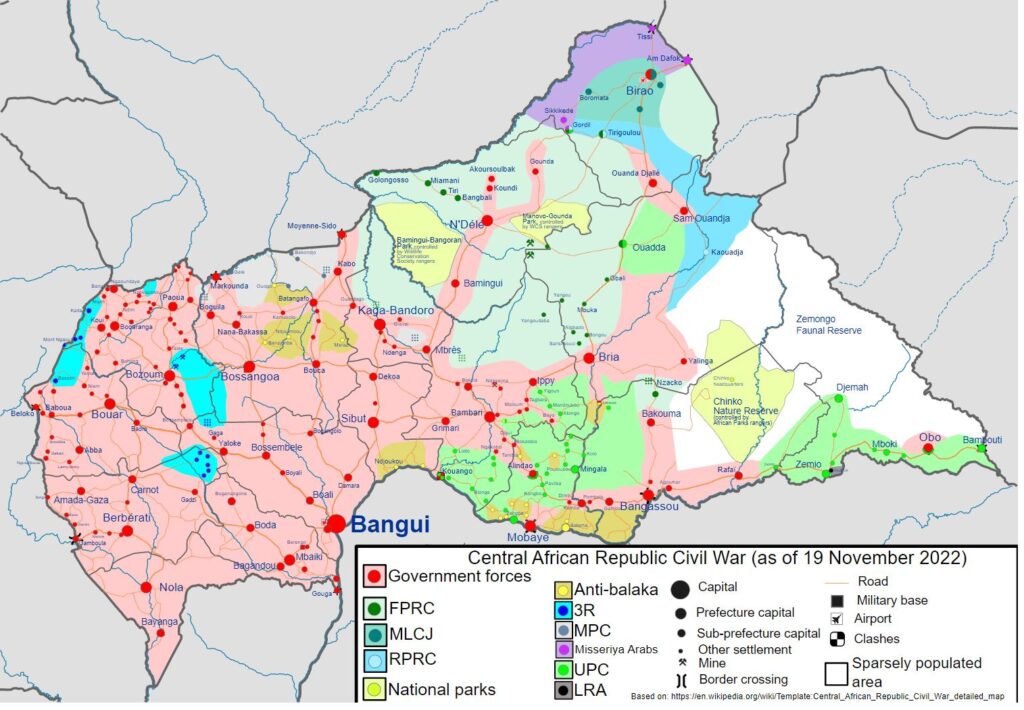
Meanwhile, about a quarter of CAR’s 5 million people are either refugees or internally displaced due to conflict, insecurity, or flooding. More than half of the population lack access to a reliable and sufficient source of nutritious food. The United Nations has been present here since 2012 to try to restore safety and human rights. In Bangui, there are UN personnel and their vehicles patrolling every street. Hotel Levy’s seems to be where many of the UN soldiers or consultants reside. I felt safe … enough.
Although CAR is the world’s second poorest country after Burundi, CAR has fabulous natural wealth in diamonds, gold, uranium, iron ore, copper, cobalt, crude oil, manganese, lumber and hydropower. Although diamonds account for half of CAR’s export revenues, at least a third of them leave the country clandestinely.
I started to wonder why a country with so many valuable resources suffers from poverty? CAR is an illustration of an economic theory known as the Resource Curse. An undeveloped country with valuable resources is like a lottery winner who struggles to manage newfound wealth. CAR’s government has focused on developing its resources because that’s where the profits are. Although resource sectors produce revenue, they often add few jobs to the economy. While investing in resource extraction, there’s been little emphasis on education, health or infrastructure. CAR has 23,810 km of roads, of which only 643 km are paved.
With limited skilled labor, CAR has almost no manufacturing. In contrast, resource-poor economies like Singapore, Taiwan or South Korea invest in health, education and infrastructure, which contribute to their economic success.
A second problem associated with a resource-based economy is that commodities have greater price volatility than manufactured goods. Price fluctuations are why the economies of resource rich countries are often volatile. If the government is inefficient or corrupt, abrupt changes in economic realities provoke breaking of contracts or curtailment of social programs, eroding the rule of law and popular support.
To add to CAR’s economic volatility, CAR recently adopted Bitcoin as legal tender (in addition to the Central African Franc). Lawmakers voted unanimously to legalize cryptocurrencies “to put CAR on the map as one of the world’s boldest and most visionary countries.” (El Salvador officially adopted Bitcoin in 2021.) Although the internet is needed to use cryptocurrencies, only 4% of people in CAR have access to the web. Go figure!
CAR remains one of the world’s least-developed countries. Sixty percent of its population live in poverty. During my week in Bangui, the power went out a few times every day. The phone network is barely 3G, and often doesn’t work at all. Wi-Fi is limited. To upload this blog, I had to fly to Uganda. Looking on the bright side, since most of its rural areas are without electric service, CAR is the world’s least light-polluted country.
As a result of wars, poverty, food shortages, diseases and almost no health care, CAR has the world’s lowest life expectancy. Here’s a summary of CAR’s unfortunate extremes:
- CAR has the world’s lowest GDP per capita at purchasing power parity. The per capita income is about $400.
- CAR ranks 188th out of 189 countries on The UN’s Human Development Index (HDI). (Niger scored 189th).
- CAR has the world’s lowest inequality-adjusted ranking, scoring 156th out of 156.
- CAR spends about $20 per person per year on health services. There’s only one physician for every 20,000 people.
- The fertility rate is about 4.5 children born per woman. Many births are guided by traditional birth attendants with little or no formal training. CAR has one of the highest maternal mortality rates in the world.
- About a quarter of women in CAR have undergone female genital mutilation.
- Malaria is endemic in CAR, and one of the leading causes of death.
- CAR’s HIV/AIDS rate is 3% of the adult population, and there’s almost no medical treatment available.
- 40% of CAR’s adult population is illiterate.
In terms of education, I found one bright spot in Bangui. A young woman from Naples, Italy named Desirée is devoting her life to building a school named Maison de la Reconciliation. With funding from churches in Italy and private donations, Desirée has created a safe and healthy learning environment for 120 students. She hopes eventually to serve her community with K-12 classes, as well as free drinking water.
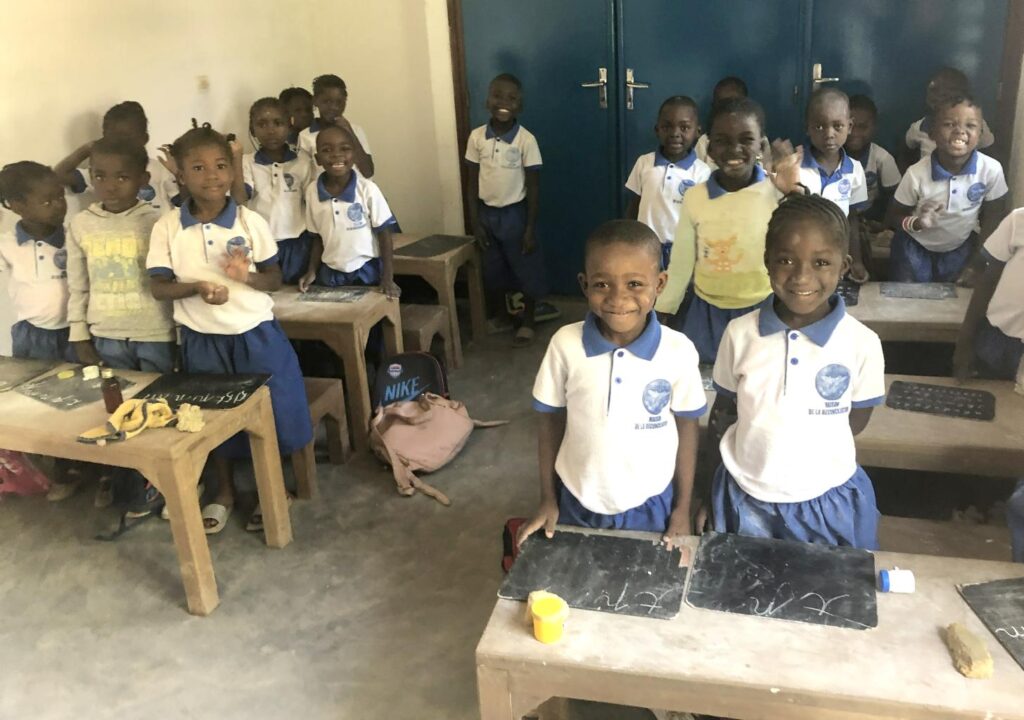
Desirée has been working in CAR for 14 years. I believe she has the vision, energy and determination to make this project a success. I made a donation to her school and wished her the best. If you’d like to make a donation to a good cause, here’s Desirée’s email: desi@riconciliazione.org
The reason I came to CAR was to see its forest elephants and western lowland gorillas. In the north, the Manovo-Gounda St Floris National Park has leopards, lions, cheetahs and rhinos. I considered an overland adventure to Cameroon, and/or a boat trip down the Ubangi River to the Republic of Congo (Brazzaville) and the Democratic Republic of Congo (Kinshasa). But in the end, I went nowhere. To travel outside Bangui, I needed the permission of the Ministry of the Gendarmerie. I visited their offices and spent an hour being interviewed by a large man who looked and behaved like Field Marshal Idi Amin of Uganda, waving his arms, challenging my identity, accusing me of illegally entering his country and describing at length the wonders of CAR … while devoting half his attention to the World Cup match blasting from the TV on his desk.
He reported me to the American embassy who sent three soldiers and a well-dressed gentleman to my hotel to explain that due to bandits and kidnappers outside of town, I could not leave Bangui without an armed escort. Aha! It’s a good thing I didn’t make a lot of travel plans in advance. I’ve often found that the more arrangements I book in advance, the more I have to change or cancel later.
With my goals to visit nearby national parks and adjacent countries curtailed, I spent the remainder of the week in the hotel bar watching World Cup soccer. With five African teams competing this year, Centralafricans are crazy about football. I practiced my French, enjoyed cold beer, feasted on an excellent menu, and watched lots of football.
There’s one more remarkable thing I learned about CAR – and it’s a weird one. CAR has the most intense magnetic in Africa and one of the strongest in the world. It’s centered on the city of Bangui, so it’s known as the Bangui magnetic anomaly.
The anomaly is theorized to be the result of a very large iron-rich meteorite which impacted the earth 540 million years ago – back when South America was attached to Africa. This impact theory may also explain why CAR and eastern Brazil are the only places in the world where large deposits of black diamonds are found. Black diamonds, aka carbonados, are formed through shock metamorphism induced by meteoritic impacts at the Earth’s surface. Diamonds from space … fascinating!
Although I didn’t feel any of Bangui’s magnetism and I probably won’t return to CAR, I encourage anyone who seeks to experience one of Earth’s most magnetic power points to visit Bangui.
Last Sunday was my last full day in Bangui. The choir welcomed me back to the tenor section for a second performance. The next day, I flew out of Bangui with a troop of UN soldiers from Nepal.
The Central African Republic (CAR) is my 171st country.
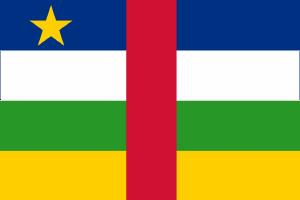
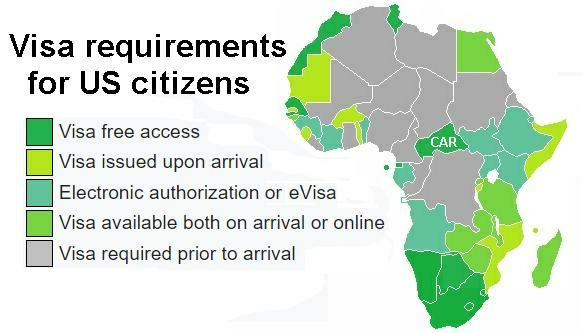
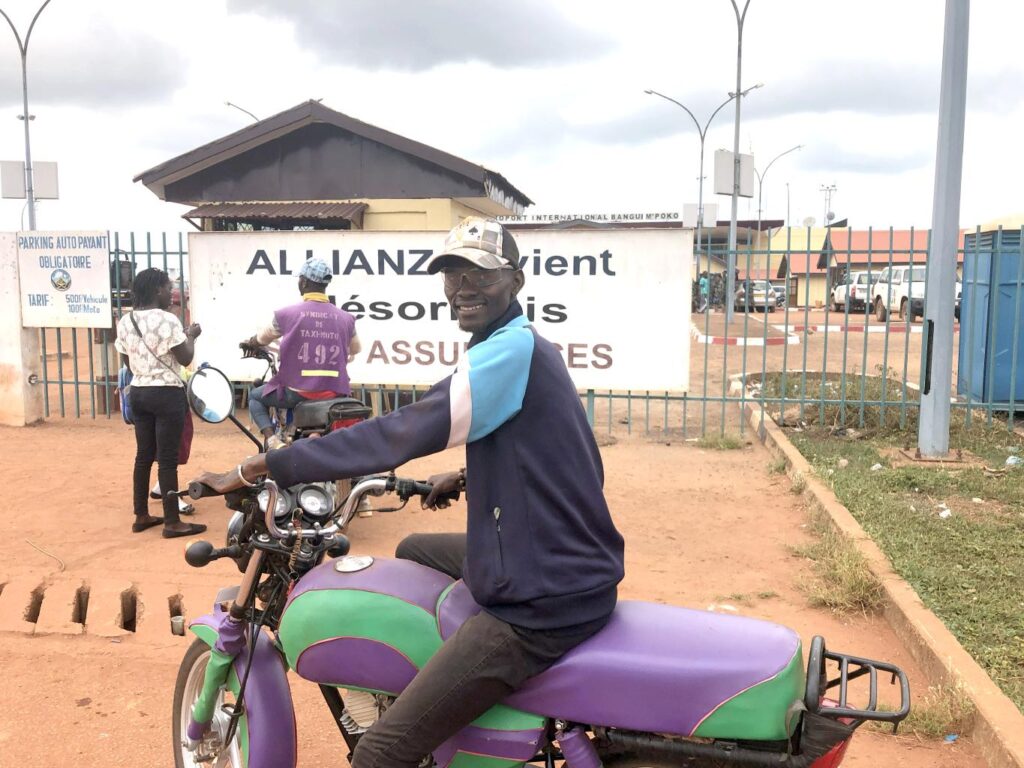
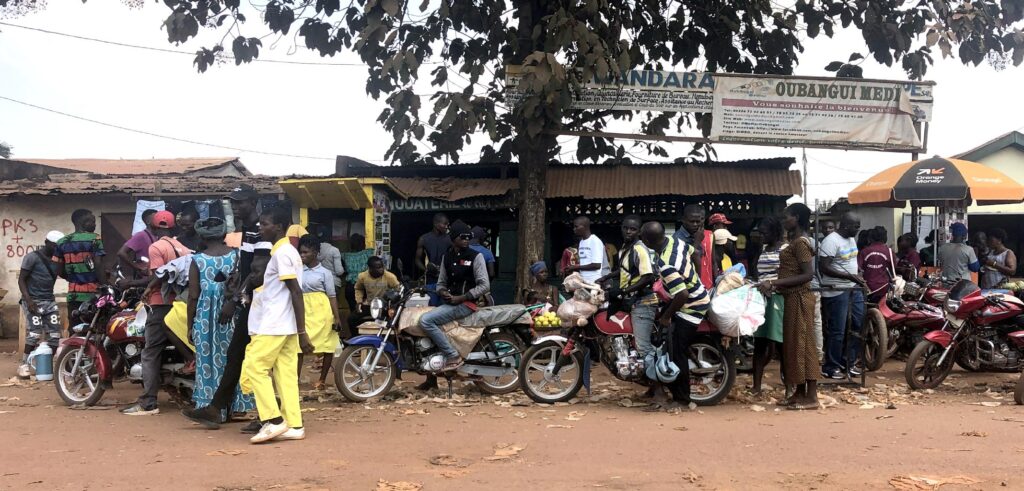
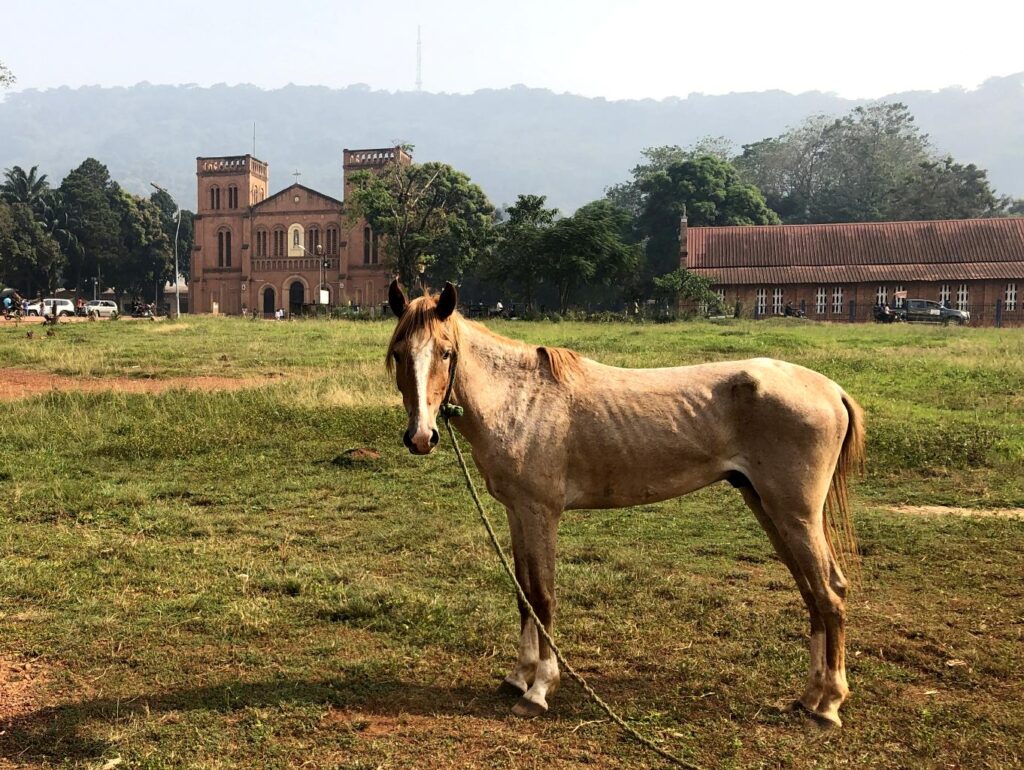
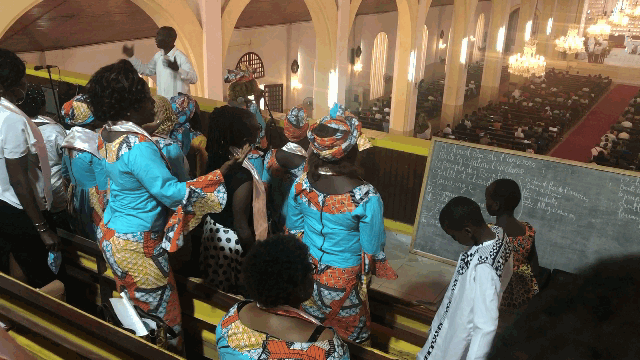

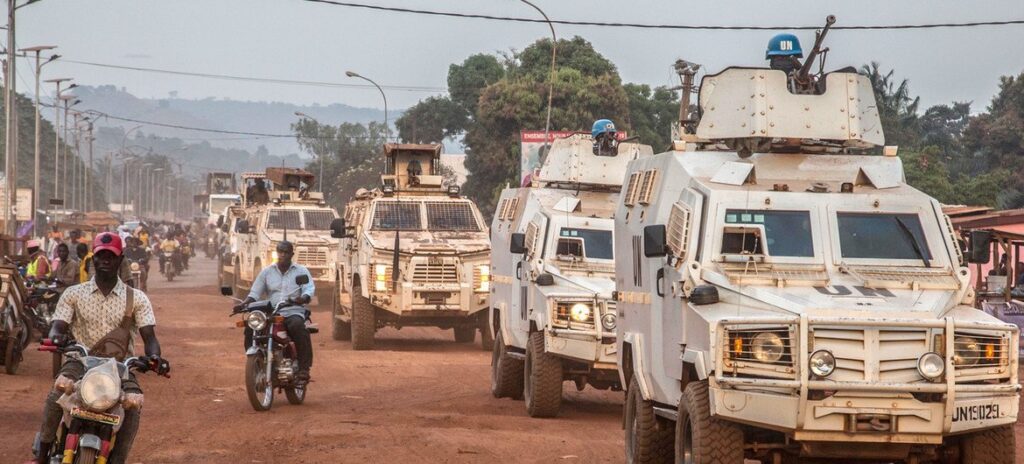
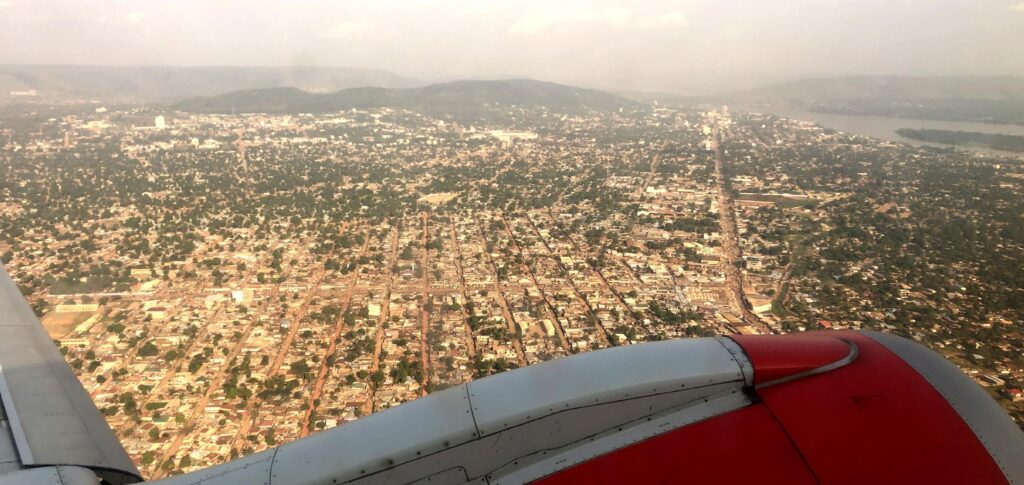


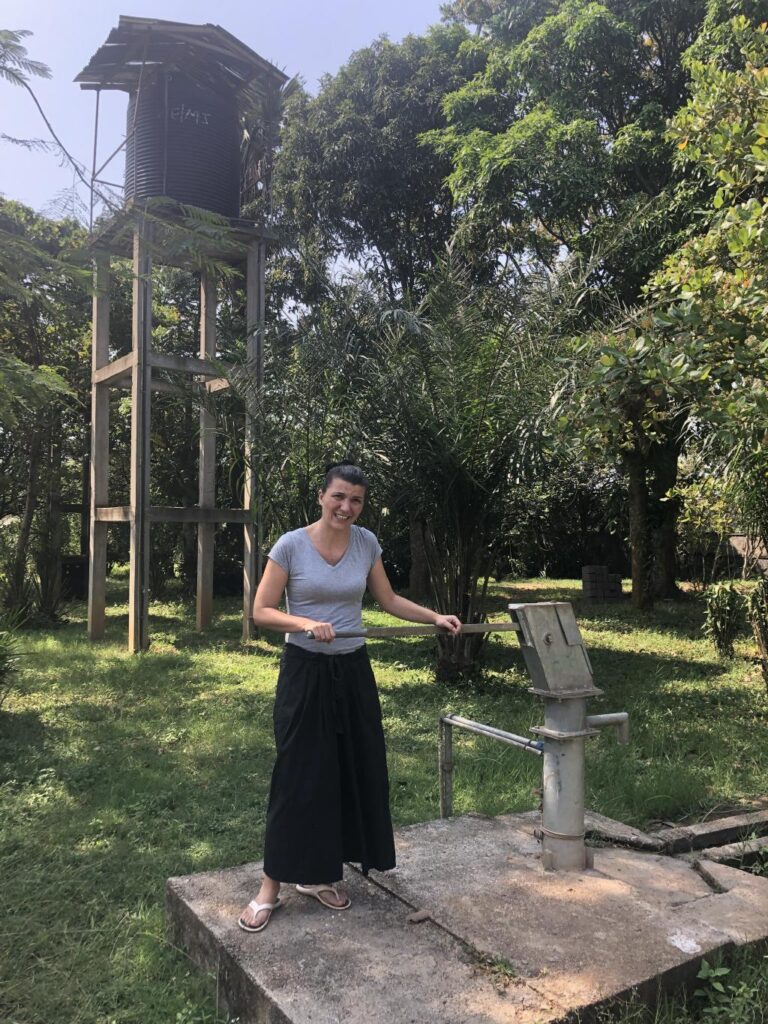

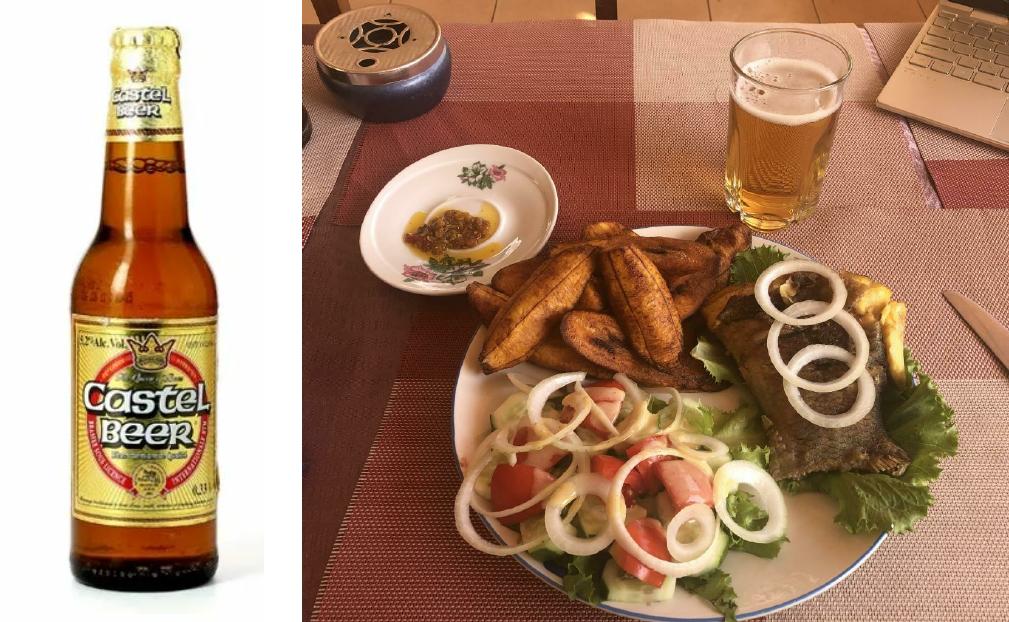

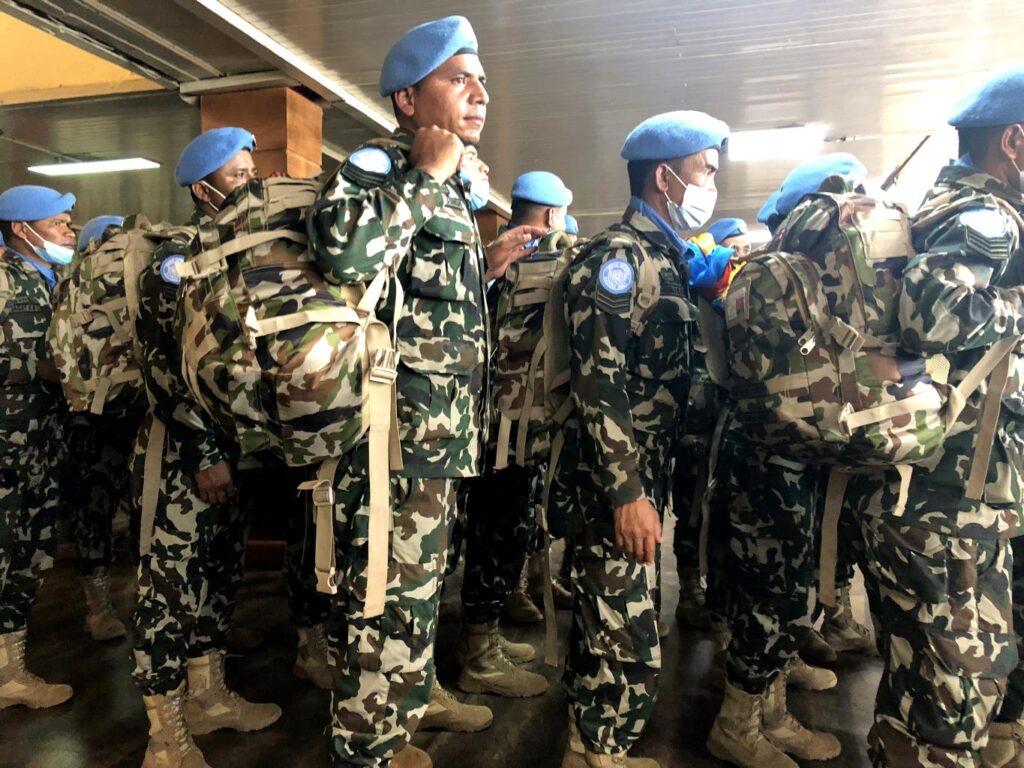
Wow, intrepid soul. Sound like you were lucky to get out unscathed.
What a fabulous adventure! Terrific tales, wonderful detail, and you sang in the choir twice!! You’ll need to write another book.
Thank you so much for sharing this Nick.
I never know much about Central African Republic as at now eventhough I am an African.
I learn a lot from you now and will plan accordingly if I am to visit Bangui someday.
Travelling is really a greater part of education.
You should have dropped into Togo for the second time for a few days from CAR.
I wish you a continued discovering of the world..
I hope to meet you once again.
Wow, Nick. Sounds like another story for your book! Safe travels!
Josie
Hi Nick – do realize your quest to visit ALL the world’s countries – however, this one seemed a bit beyond reason?? At the same time ,was one of your more interesting – WOW the motor cycle ride, and, more impressive the church choir and the beautiful music (especially the tenor section!)
The church appeared to be quite full – very different from our area – people probable have more of a reason for a supportive messages than our Mystic and US “complacency”.
Much appreciated – Bill H.
I’ve often wondered if the U.S. State Department walks a diplomatic tightrope when issuing travel advisories and warnings. This one appears well-warranted. Conditions in CAR point to the need of rule of law and the peaceful transfer of power (are you listening, America?). Interesting post, and good to hear that you made it to yet another country.
The ride into town sent chills down my spine. I’m proud to say that I’m acquainted with a person that is willing to take on such adventures. Keep the stories coming.
Wow! Another country down. Don’t think I will try that one. Great information and as always you had a great and very interesting trip. Thanks for sharing. Dana & Nancy.
Well, I’m speechless and have you bookmarked for more astonishing reading, but I did listen to the beautiful choir and actually recognized a hymn around 5:20 and wondered if you were the voice around 7:20! Sorry to have missed you during your last proposed visit to Stonington with another fascinating presentation. Let’s try again! Happy Holidays to YOU! So glad you survived this last adventure . . . night and day from the cruise ship experience! The motorcycle taxi ride was a hoot, even though I got a lot of dust in my eyes with backup on my screen! Hugs across the wires!
after your article, i was all set to go to bangui until i saw the air flight prices and the tight layover transits. thank you for going to car. by the way, i took your advice and went to the 4 ex yugoslavian countries in may and to the 3 guyanas in november. you are my hero! nathan
Hi Nick,
This was one of your most interesting travel reports yet. Thanks for the historical detail. I am back in Sinjar, Iraq, and the government electricity goes out many times per day for about three hours each time. During the day I get about 4 or 5 hours of government electricity. The neighborhood backup generator often does not work.
CAR was where the US CIA operatives flew democratically elected President Aristide and his wife when they covertly overthrew him in Haiti in 2004. You can read Amy Goodman’s report here: https://www.democracynow.org/2004/3/11/in_depth_the_full_story_of
For anyone who wants to read the true and gripping story of how the US government covertly removed Jean-Bertrand Aristide from Haiti in 2004 and flew him to Central African Republic, read the book by American Randall Robinson, An Unbroken Agony: Haiti, From Revolution to the Kidnapping of a President.
https://blackagendareport.com/content/new-randall-robinson-book-reveals-truth-aristide-kidnapping
https://www.wsws.org/en/articles/2004/03/hait-m01.html
You make us feel like 🛋️🥔🥔!!😉😅
Hope to see you when back in our area..safe (🤞?!!) travels and happy holidays🥂!
The photos of CAR are reminiscent of Guinea. Like CAR, Guinea is rich in resources , and like CAR, Guineans don’t reap the benefits. Peace Corps has been reinstated in Guinea but I’m not sure ELFs (English Language Fellows – my program) have. The people I met and got to know in Guinea were kind, patient, and seemingly resigned to their plight. From your description, CAR is in much worse condition. There’s too much misery in the world to contemplate.
Barbara
Once again you introduced me to a corner of the world with which I was not familiar. Thanks!
You described a sad and discouraging situation in the capital city. It’s unfortunate the first world countries and societies cannot cease their squabbling to provide useful aid to such countries. Of course, the local cultures need to reject the local bullies.
Hi Nick, That truly was a memorable read/experience. The idea to provide a video of the motorcycle ride was so informative. You took us all there. I also truly enjoyed listening to the choir sing. Again, you gave us a snapshot of what it feels like to hear the soul of the CAR people, and to see them dance.
It was a sad tale to learn of the resources receiving all of the funding in this country at the expense of education, health and a basic quality of life for these people. To hear of their health issues, and short life span is truly disturbing in such a developed world. However, there was hope……Desiree. She was a true inspiration.
I’m glad you got out of there safely.
xo